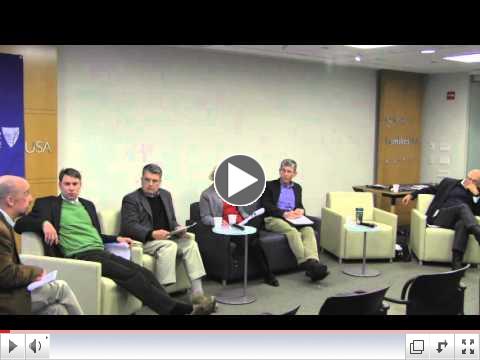|
|
|
Nicholas Institute for Environmental Policy Solutions - February 5, 2014
|
|
 | | Washington Forum: Emerging Issues in Deep Sea Policy |
|
|
|
|
| Study in Nature Focuses on Deep Sea
 More than one million square kilometers of the sea below 200 meters in depth are being plowed by trawlers, and the next decade will see expansion of oil, gas and mineral extraction into deep sea waters. Formal governance structures and funds need to be implemented by 2020 to create networks of sea floor reserves that maintain and restore biodiversity and functioning of deep sea ecosystems, the Nicholas Institute for Environmental Policy Solutions' Linwood Pendleton and colleagues write in the journal Nature. More than one million square kilometers of the sea below 200 meters in depth are being plowed by trawlers, and the next decade will see expansion of oil, gas and mineral extraction into deep sea waters. Formal governance structures and funds need to be implemented by 2020 to create networks of sea floor reserves that maintain and restore biodiversity and functioning of deep sea ecosystems, the Nicholas Institute for Environmental Policy Solutions' Linwood Pendleton and colleagues write in the journal Nature.
|
Climate Conference Slated for March
The Nicholas Institute will serve, for the third consecutive year, as a program partner for the Climate Action Reserve's Navigating the American Carbon World (NACW) conference March 26-28. The conference will examine future growth and expansion of California's historic cap-and-trade program as well as other established and emerging carbon markets around the world, national climate change policy and innovative environmental initiatives. |
Staff Contribute to Award-Winning Book
A textbook by a Duke University faculty member, which features a chapter written by Nicholas Institute staff, was recently named an Outstanding Academic Title for 2013 by Choice review online. The book, Environmental Leadership: A Reference Handbook, features a chapter that outlines the Nicholas Institute's unique structure as a university-based institute. |
Follow us on LinkedIn
Receive regular updates on Nicholas Institute events, research and videos on our LinkedIn page. Follow us today. |
Watch Workshop on Urban Planning
Experts and practitioners recently visited Duke to discuss how innovative cities are integrating ecosystem services into urban planning. Panelists discussed transferability of their approaches to other cities. Watch videos of speakers providing insights into environmental policy and market tools. |
Emissions Reduction in Calif. Agriculture
As part of California's effort to reduce global warming, the state has agreed to cut greenhouse gas emissions to 1990 levels by 2020. Ahead of the release of a scoping plan that spells out priorities for the next five years, a new report series produced by the Nicholas Institute in collaboration with California university researchers examines potential greenhouse gas reduction strategies for the state's agriculture. |
Streamflow in the South Atlantic
A new study in the journal Water Resources Research uses Budyko curves to ascribe streamflow changes to climate and human factors in the South Atlantic. It finds climate contributed to increased streamflow, by an average of 14%, in the region since the 1970s. Human factors varied from basin to basin and either amplified or minimized climate's effect on streamflow. |
Faculty Comment on State of the Union
Did you miss President Barack Obama's State of the Union address? See the Storify capturing real-time Twitter commentary from the Nicholas Institute's Jonas Monast and other Duke faculty. |
Study: Dental Fluorosis in Ethiopia
Elevated levels of fluoride in drinking water is a well-recognized risk factor for dental fluorosis. In a study published in the journal Science of the Total Environment, authors found flouride to be strongly associated with dental fluorosis in a sample of more than 1000 individuals living in several rural communities in the Ethiopia. Age, sex and milk consumption also were found to correlate with dental fluorosis outcomes. |
|
The Nicholas Institute for Environmental Policy Solutions helps decision makers create timely, effective, and economically practical solutions to the world's most critical environmental challenges.
|
|
|
|
|
|
|
|
|
|
Nicholas Institute for Environmental Policy Solutions, Duke University,
P.O. Box 90335, Durham, NC 27708.
|
|
|